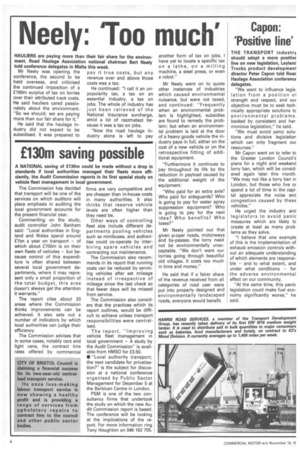Neely: 'Too much'
Page 8

If you've noticed an error in this article please click here to report it so we can fix it.
HAULIERS are paying more than their fair share for the environment, Road Haulage Association national chairman Bert Neely told conference delegates in Malta this week.
Mr Neely was opening the conference, the second to be held overseas, and criticised the continued imposition of a f160m surplus of tax on lorries over their attributed track costs. He said hauliers cared passionately about the environment. "So we should; we are paying more than our fair share for it."
He said that the haulage industry did not expect to be subsidised. It was prepared to pay it true costs, but any revenue over and above those costs was a tax.
He continued: "I call it an unpopularity tax, a tax on an essential industry, a tax on jobs. The whole of industry has just been relieved of the National Insurance surcharge, amid a lot of razzmatazz because it was a tax on jobs.
"Now the road haulage industry alone is left to pay another form of tax on jobs. I have yet to locate a specific tax on a lathe, on a milling machine, a steel press, or even a robot."
Mr Neely went on to quote other instances of industries which caused environmental nuisance, but were not taxed, and continued: "Frequently when an environmental problem is highlighted, subsidies are found to remedy the problem; but when an environmental problem is laid at the door of a heavy goods vehicle the industry pays in full, either on the cost of a new vehicle or on the retrospective fitting of additional equipment.
"Furthermore it continues to pay throughout its life by the reduction in payload caused by the additional weight of the equipment: "Who paid for an extra axle? Who paid for sideguards? Who is going to pay for water spray suppression equipment? Who is going to pay for the next idea? Who benefits? Who loses?"
Mr Neely pointed out that given proper roads, motorways and by-passes, the lorry need not be environmentally unacceptable. "We don't want our lorries going through beautiful old villages. It costs too much in time and money."
He said that if a fairer share of the revenue received from all categories of road user were put into properly designed and environmentally landscaped roads, everyone would benefit.




































































































